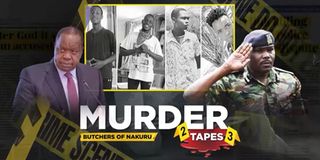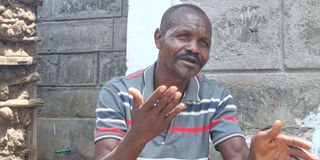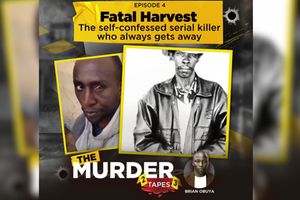
Murder Tapes Ep 7: The ‘butchers of Nakuru’ and police execution of four young men
On July 14, 2022, police officers shot dead four youth in Kwa Maiko village in Barut area, Nakuru West sub-county, during a security operation.
Then Nakuru County Police Commander Peter Mwanzo, just 16 days into the job, told the media that the four were members of a gang called Nyuki Squad, which had been linked to a spate of robberies and violence within the county.
He said that the officers, who were acting on reports from residents that there were youth attacking unsuspecting passers-by, disguised themselves as civilians swung into action. The gang members, who Mr Mwanzo said were armed with arrows and pangas, were ordered to stop but refused to obey orders. It was then that the officers opened fire, killing the four on the spot.
Mr Mwanzo further explained that before the shooting, the officers fired a warning shot to scare the suspects away, but they allegedly called for reinforcement from other members who were hiding.
He added that an unknown number of suspects escaped into the neighbouring maize plantation with gunshot injuries and urged hospitals to report if any showed up for treatment. At the end of the operation, he said, the officers managed to recover weapons, including pangas, bows and arrows, as well as SIM cards and mobile phones from the suspects.
Days later, the identities of the four were revealed: Collins Kibet Kirui,16, Collins Kipkorir,21, Kevin Kipyegon,20, and Denis Kipchirchir, 23, who were working as sand harvesters in a quarry within Barut. Kipyegon and Kipchirchir were brothers while Kipkorir and Kibet were their friends.
Mr Mwanzo’s version of events, those of the young men’s families and witnesses, and what the police later told the Independent Police Oversight Authority (Ipoa) differed significantly — and points to the possibility of execution by overzealous police. Witnesses and the families of the young men that the Nation spoke to said the four were rounded up from their houses and shot in Kipchirchir’s house.
According to neighbours, Kibet and Kipkorir were killed inside the house (they were handcuffed) while Kipyegon and Kipchirchir were brought outside the house before the officers shot them within the compound before taking their bodies away.
Post-mortem examinations on the four bodies were conducted at the Nakuru City Mortuary and were attended by different human rights bodies and the victims’ families.
Government pathologist Titus Ngulungu confirmed that the four were shot at close range.
He stated that Kipchirchir’s body had a gunshot wound on the left side of the chest another wound on the left side of the head. The body also had bruises on the forehead.
Kipyegon had bruises on his face and a gunshot wound entry near the left ear, with another gunshot wound on the right side of chest.
Kibet had two gunshot wounds on the head, two in his chest and one on the left hand palm, while Kipkorir had one wound on the left side of the shoulder and another in the head.
The shooting pattern indicated a high probability that they were executed by the same person.
The pathologist retrieved two bullets from two of the young men, and these were forwarded to Ipoa.
Human rights defenders said the youth were executed in cold blood terming it a classic extrajudicial killing case.
In a statement, Ipoa Chairperson Ahmed Issack Hassan said some of the officers involved in the shooting were attached to the Kasarani Station in Nairobi, where Mr Mwanzo was stationed before he was moved to Nakuru.
He added that the agency had requested the Directorate of Criminal Investigations (DCI) Nakuru West and DCI Kasarani Nairobi to forward the officers’ firearms for ballistic examination. The suspect officers’ statements were also recorded.
“The Authority collected crime scene photos and reports from the CCIO Nakuru. The only pending activity before submission of the file to ODPP [Office of the Director of Public Prosecutions] is obtaining a ballistic report from the DCI, Kasarani. Even as we await this report, the Authority has commenced the process for the prosecution of the officers who were involved in the shooting. Ipoa is committed to this investigation and reassures all of its dedication,” wrote Mr Ahmed in the letter.
Recalling the fateful events, Kipkorir’s elder brother Elvis Bett said that he was asleep when he was woken up by their dog barking incessantly, before he heard a knock on his door. Before he could open, he heard them saying they had knocked on the wrong door and proceeded to his younger brother’s door.
Kipkorir was with his wife, with whom he was expecting their first child. They ordered his brother to get up and get dressed, but before leaving, they debated whether to kill him in his house or to go away with him. They agreed to leave with Kipkorir.
After thirty minutes, Mr Bett heard gunshots, followed by loud conversation in a radio call: “Two are down, send Land Cruiser”, before he heard more gunshots. That is when he knew they were police officers.
“They took him to his friend’s house. I climbed a tree and from there I could try to see and hear what was happening; I could only see lights. After all went silent, I told my father we should go and see what had happened, but he pleaded with me that we wait till morning,” he recalled.
According to Mr Bett, he could hardly sleep, he proceeded to his brother’s house at 6am but before he could get into the compound, one of the neighbours who had seen him started crying. At the doorstep, he found his brother’s slipper, which had bloodstains, the house had been ransacked but his brother and his friends were nowhere to be found.
Hours later, photos started circulating online; the bodies of the four were lying in a pool of blood partially covered. What caught Mr Bett’s attention was the one slipper his brother had worn.
A long search landed them at the Nakuru City Mortuary where the bodies had been moved.
“What I saw that day has never left my mind; my brother’s lifeless body was just lying on the floor, he had gunshot wounds on the head and chest. I was left speechless for a moment. What I know is someone who knew us was directing the officers. They died a painful death,” he said
The families, he said, were instructed to bury their loved ones within four days. Luckily, neighbours fundraised and helped to cater for the expenses.
“There was no time to mourn them. We were the first ones to bury our brother, the next day, the two brothers were buried in their mother’s farm. The younger one was buried in Londiani, Kericho County. We later recorded our statement with Ipoa, but since then we have never heard anything from them. We left our contacts. I have not received any call; I have not changed my number. We are still waiting for our justice,” he said.
Kipkorir’s father, Samwel Cheruiyot, who was also woken up by the commotion said that the incident happened just two days after he buried his wife Daisy Cherono.
He said that he went to his second-born son’s house to find out what was happening only to find three officers standing outside while another one was inside the house.

Mzee Samuel Cheruiyot during an interview at his home in Kwa Maiko, Barut, Nakuru County. His son Collins Kipkorir was shot dead by police officers on July 14, 2022 and three years later the family is yet to get justice.
He said that one officer asked him who he was and what he wanted there, and after introducing himself, they ordered him to go back to sleep without telling him what they wanted at his son’s house.
Mr Cheruiyot said that he left and stood at a distance. After a short while, the officers left with his son and got onto two motorcycles that were waiting outside the gate. After about one hour, he said, they heard gunshots emanating from the house.
“It was a long night. But when we heard gunshots I just told his brother he had been killed. I counted more than 10 gunshots. Their bodies were taken to the mortuary at 1pm. We do not know where they got the bows and arrows and bhang they paraded. I have never seen such, they could have just arrested them and taken them to court,” he said.
They were surprised when Mr Mwanzo told journalists that the four were killed after they attacked officers on the road and yet they were picked from their houses. Mr Cheruiyot said his son was working as a sand harvester in a quarry a few kilometres from their home since he dropped out of school in Form Two.
Ms Maurine Cherono received a distressing phone call from her sister at night, informing her that she had been told by Kipyegon’s girlfriend that police officers had stormed their house. The girlfriend said the officers alleged that Kipyegon was selling bhang and that he was a member of a gang that had been terrorising residents. The officers then left with Kipyegon.
After receiving the news, Ms Cherono, a resident of Mzee wa Nyama, said that she tried to call Kipchirchir, who lived a kilometre from Kipyegon, but his phone went answered.
In the morning, Ms Cherono said she called one of her brothers’ neighbours to check on them but they were not there, only reporting that she saw blood within the compound.
“We prepared ourselves and proceeded to Barut; what I saw left me shaken. There was blood all over. The neighbours told us we should go to Nakuru Teaching and Referral hospital mortuary, but we were referred to Nakuru City Mortuary where they had moved their bodies,” she said.
Later, they leant that after the officers picked their lastborn, Kipyegon, from his rental house, they took him to Kipchirchir’s house, then Kibet and Kipkorir were brought in.
Recalling their last moments together, Ms Cherono said that the two brothers had planned to visit home, but they were overtaken by the day’s events and postponed until the next day, only to be killed that night.
“Our brothers were working as sand harvesters. If they were indeed criminals as alleged, the officers should not have killed them, instead they should have been arrested and taken to court. It’s better visiting them in jail while they are alive than killing them. We are now only two siblings, my sister and I, our mother passed away in 2016 while our father died in 2000,” she said.
According to Ms Cherono, days later videos and photos circulated online, and from that he heard the officers telling her brothers to say their last wishes— Kipchirchir requested to be allowed to say his last prayer while Kipyegon requested he be shot near their mother’s grave.
Kibet, just 16, was known for his love of football and dreams of becoming a teacher. He had visited his grandmother and uncles and had been around for roughly two months when he was shot.
His cousin, Kipkorir worked diligently to support his younger siblings. Kipyegon and Kipchirchir were described by neighbours as respectful and hardworking.
“I don't know if we will ever get justice over our brothers’ brutal murder. It has been three years of mourning our brothers who were killed in cold blood by officers. The case went silent but we do not know who to run to,” said Kipyegon’s other sister Millicent Chepkemoi.








